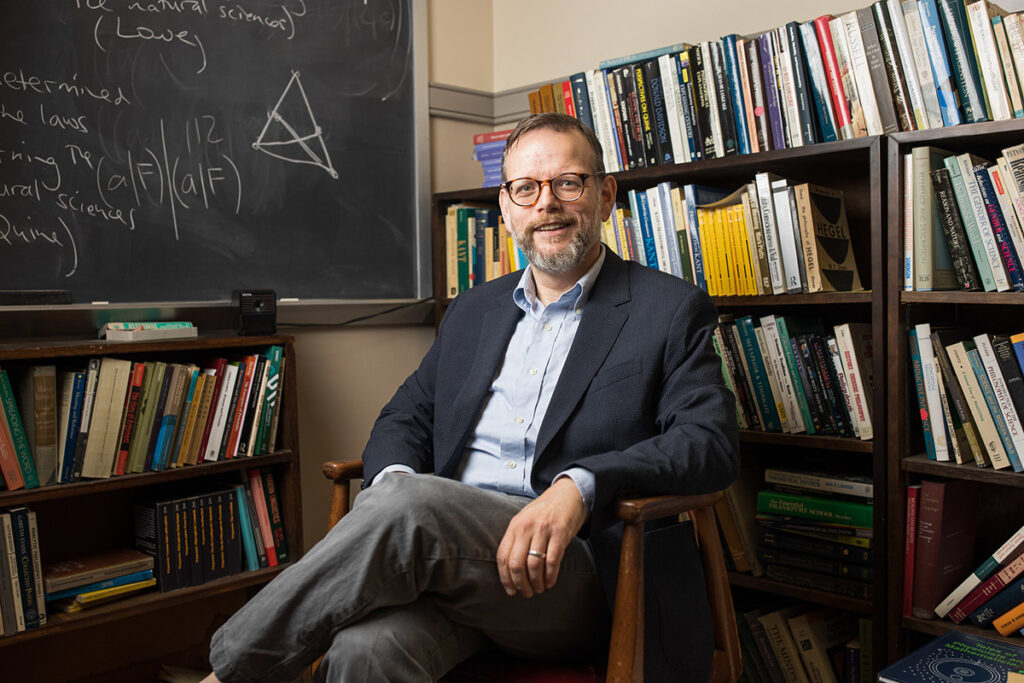Highlighting our faculty
- Faculty at Lafayette College are renowned leaders in their respective fields, exceptional teachers and dedicated mentors. Read more about our faculty.
Learn more about Prof. Shieber, James Renwick Hogg Professor of Mental and Moral Philosophy, Department of Philosophy

Research area: My main research area is the theory of knowledge. Within that broad field, I am particularly focused on how people acquire knowledge through communicating with others. That’s the subject of my 2015 book with Routledge, Testimony: A Philosophical Introduction. I also have related interests in propaganda and ideology. This is a particularly exciting area for me, because researchers up to now haven’t paid sufficient attention to how propagandistic or ideological communications influence how we know what we know.
My Lafayette journey: After receiving my Ph.D. from Brown University in spring 2003, I began teaching at Lafayette in fall 2003.
I have a great appreciation for the liberal arts experience. One of my lasting memories from my own undergraduate education was a yearlong ‘great books’ style sequence of courses for incoming first-year students that I participated in. In some ways I’ve been trying to recapture that experience ever since. I was also drawn to the collegiality of the Philosophy Department at the time—George Panichas, the previous Hogg Professor, Owen McLeod, now chair of the department, and Julie Yoo, currently a professor of philosophy at Cal State Northridge—were a very close-knit and supportive group.
What I have enjoyed and found most fulfilling: I’ve enjoyed teaching and mentoring students the most. One of the highlights was when one of my students, Megan Feeney, was accepted to the graduate program in philosophy at Rutgers University, the preeminent program for philosophy in the world. However, each semester brings new joys when I get to share with my students what it means for them to be introduced to some of humankind’s greatest ideas for the first time. It is also a pleasure for me to interact with my brilliant colleagues from other departments. One of the strengths of Lafayette is that its small size makes it ideal for professors to interact with each other unconstrained by traditional disciplinary boundaries. Concretely for me that has meant that—just to cite three examples—I’ve team-taught a course on Set Theory and the Philosophy of Mathematics with Lorenzo Traldi from the Math Department; I’ve visited one of Jennifer Talarico‘s psychology seminars on memory to talk about my experience with aphantasia; and I’ve used information from discussions with colleagues in the English Department to inform my own research on Early Modern English philosophy.
What receiving an endowed chair means to me: It is immensely gratifying to receive this recognition of my scholarship and teaching from my colleagues and the College. Within academia, an endowed chair is the pinnacle that a professor can hope to achieve, and I am deeply moved that my colleagues thought me worthy of the honor.
How this endowed position furthers my teaching and/or research: The research funds associated with the Hogg Professorship will afford me greater freedom in pursuing lines of research that I otherwise would have had to defer. Most immediately, this means research-related travel to allow me to explore theories of propaganda in the German-speaking world at the beginning of the 20th century. There has been a great deal of research on British and U.S. theorizing about propaganda in the pre-WWII period, and obviously there has been a wealth of research about the use of propaganda in the German-speaking world in the 20th century, but there hasn’t been very much research about how German and Austrian thinkers themselves conceived of propaganda in the pre-WWII period. The Hogg endowment will allow me to travel to Austria and Germany so that I can do primary source research on this topic in the archives there.
One additional point that I’d like to raise is that endowments like the Hogg Professorship really do provide an outlet for people to make a lasting impact. I did a little research on Hogg himself—he wasn’t that easy to track down.
The most information I could find about him was in a book about alumni of the Faires Classical Institute in Philadelphia, where Hogg attended high school. The entry makes it clear that he was a successful businessman and an active supporter of Lafayette College—both worthwhile endeavors. In some sense, though, all of the research and teaching achievements of all of the Hogg Professors are also part of Hogg’s legacy.
What I will be teaching in the fall: In the fall, I’ll be teaching Logic, which I teach every fall, Philosophy of Law, and my FYS on Propaganda.